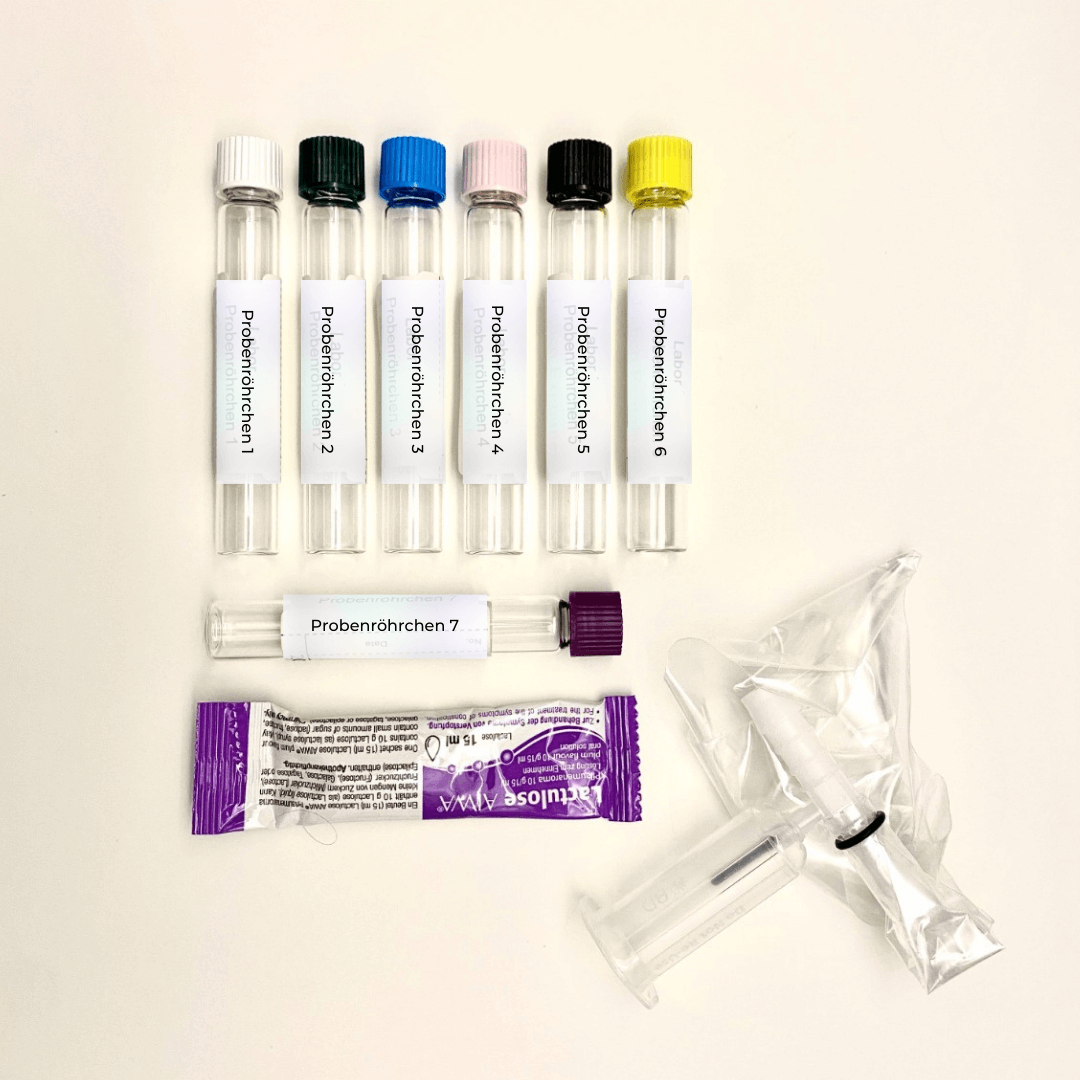Small intestinal bacterial overgrowth (SIBO) – the growing importance of SIBO
Small intestinal bacterial overgrowth (SIBO) – What SIBO actually is – explained simply
SIBO (Small Intestinal Bacterial Overgrowth) indicates whether there are too many microorganisms thriving in the normally rather germ-free small intestine. This can feel as if your digestive system is constantly in rush hour mode: bloating, abdominal cramps, irregular bowel movements – and sometimes even headaches, fatigue, or sleep problems.
A laboratory test helps to identify the blockage and resolve it in a targeted manner.
We use the practical information from ORY Berlin as a reliable basis: modern, well-founded laboratory diagnostics plus personal support – exactly the combination needed for complex topics such as SIBO.
The large intestine is a thriving city for the microbiome. The small intestine, on the other hand, is more like a quiet suburban terraced house – it usually harbors far fewer germs .
In SIBO, this balance is disrupted: The number of germs in the small intestine increases significantly, carbohydrates are "predigested" there, and gases such as hydrogen and methane are produced – the stomach feels bloated, and digestion is disrupted.
How to measure SIBO:
The gold standard in practice is a breath gas test (H₂/CH₄) . You drink a sugar solution (e.g., lactulose), then hydrogen and methane in your breath are measured at fixed intervals.
An early increase within 90 minutes suggests SIBO. Modern guidelines recommend measuring hydrogen (H₂) and methane (CH₄) simultaneously – methane is often associated with a tendency towards constipation.
ORY Berlin offers precisely these holistic profiles with modern partner laboratories – for a complete picture of your gut.
How to measure SIBO:
The gold standard in practice is a breath gas test (H₂/CH₄). You drink a sugar solution (e.g., lactulose), then hydrogen and methane in your breath are measured at fixed intervals.
An early increase within 90 minutes is indicative of SIBO. Modern guidelines recommend measuring hydrogen and methane simultaneously – methane is often associated with a tendency towards constipation.
When the balance tips: Symptoms & triggers
Typical signs:
- Bloating, cramps
- Diarrhea or constipation
- Feeling of fullness, bloating
- Fatigue, headaches,
- Sleep disorders, low moods
Because the gut communicates with the whole body via the nervous and immune systems – and when there is chaos there, you can feel it in your head too.
Why does this happen?
- Slower bowel movements: e.g., due to irritable bowel syndrome, medications (acid blockers, opiates)
- Malabsorption & underlying diseases: e.g. celiac disease, liver or pancreatic problems
- Weakened mucosal immune system: for example due to stress, age or chronic inflammation
The methane twist:
Studies show that methane-positive breath tests are often associated with constipation (IBS-C) – indicating a completely different “traffic situation” in the intestine than hydrogen dominance.
What does SIBO mean for health and everyday life?
In the short term, the symptoms are bothersome. In the long term, however, chronic dysbiosis can lead to nutrient deficiencies – for example, in vitamins A, D, E, B vitamins, iron, or calcium. The intestinal lining also becomes irritated, and the immune system is under constant stress. Therefore, if a breath test reveals abnormalities, it is worthwhile to investigate further.
Consider laboratory values – e.g.:
- Calprotectin (inflammatory marker)
- Zonulin & Histamine (intestinal barrier)
- Bile acid balance
- sIgA (mucosal immunity)
What you can do yourself – practical lifestyle levers: Some simple measures can help to relieve the small intestine:
- Take test preparation seriously: Eat lightly the day before, no alcohol, no probiotics, arrive on an empty stomach – this makes the test more reliable.
- Eating rhythm with breaks: 3-4 meals per day, no constant snacking – this allows the “migrating motor complex”, which regularly “sweeps through” the small intestine, to recover.
- Movement as a driving force: Daily moderate activity (e.g. walks, yoga, cycling) stimulates intestinal motility.
- Sleep & Stress Balance: The gut loves rhythm. 7-9 hours of sleep and conscious relaxation (breathing, meditation, nature) help.
- Check nutrients: If an abnormal finding is detected, be sure to also check vitamin and mineral profiles – this fits perfectly into the holistic concept of ORY Berlin.
Medical perspective: Guidelines recommend –
Depending on the findings, targeted antimicrobial strategies, motility promotion, and individualized dietary management are recommended. Breath tests should measure H₂ and CH₄; test protocols (e.g., 10 g lactulose) are now standardized. The ACG guideline (2020) also emphasizes that SIBO is not a marginal issue but frequently underlies irritable bowel syndrome, fatigue, or unexplained abdominal discomfort—and can be very effectively stabilized with timely treatment.
Who is affected?
SIBO doesn't present in a uniform way – many cases go undetected. Studies show that women and older people are particularly affected. In addition to genetic predisposition, motility disorders, hormonal changes, stress, and certain dietary habits also play a role.
Main causes and risk factors:
- Mechanical factors: small bowel tumors, postoperative adhesions, defecation syndromes
- Systemic diseases: diabetes mellitus, scleroderma, amyloidosis, metabolic syndrome
- Motility disorders: Irritable bowel syndrome, pseudo-obstructions, mitochondrial dysfunctions
- Medications: Opiates and proton pump inhibitors slow down intestinal motility or reduce the antibacterial effect of stomach acid.
- Malabsorption: Pancreatic insufficiency, liver cirrhosis, celiac disease, IBD, lactose or fructose intolerance
- Immunodeficiencies: e.g., sIgA deficiency, immunosuppression
- Age & Diverticula: “Bacterial niches” form when food collects in folds of the intestinal mucosa.
→ All these factors can disrupt the delicate balance of the small intestine microbiome.
Takeaway for practical use
- In case of suspected SIBO: comprehensive medical history (motility factors, medications, underlying diseases), thorough diagnostics (breath test + additional markers) and interdisciplinary coordination.
- Treatment should be individualized: identify the cause (e.g., motility disorder, stasis), optimize nutrition, and, if necessary, support the mucosal barrier.
- Monitoring: Checking nutrients, preventing relapses, long-term follow-up.
Bibliography
- Knez E. et al. The importance of food quality, good motility, and the microbiome… 2024.
- Wang Z et al. Small Intestinal Bacterial Overgrowth and Metabolic-Associated Steatotic Liver Disease… Front. Nutr. 2024.








